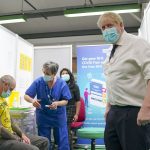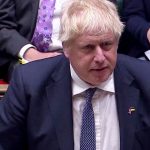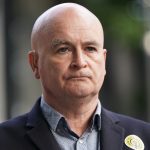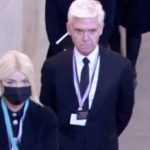Junior doctors in Scotland have called off strikes planned for next week after their union agreed an improved pay offer from the government.
Members of BMA Scotland were poised to launch three days of industrial action on 12-15 July after they rejected an initial offer of a 14.5% increase over two years.
The Scottish government then came back with a revised offer of a 12.4% pay increase for junior doctors and doctors in training for 2023/24, alongside a pay rise of 4.5% awarded in 2022/23 – amounting to a cumulative increase of 17.5% over two years.
BMA Scotland said its Scottish Junior Doctor Committee (SJDC) today agreed unanimously that it would recommend members accept the offer in a consultative vote in the coming weeks.
Politics latest:
Labour lead over Tories widens in poll of polls
First Minister Humza Yousaf said he was “grateful” to the BMA for engaging with the government and agreeing to suspend strike action.
Dr Chris Smith, chairman of the BMA’s Scottish junior doctor committee, said: “This has been an intense period of negotiation with the Scottish government.
Scottish government calls on Westminster to decriminalise personal drug use
Police launch investigation after car firebombed outside HMP Perth
Amber Gibson: Connor Gibson on trial accused of sexually assaulting and murdering sister
“At this stage, our negotiating team feel they have reached the limit of what can be achieved this year and do not think strike action would result in a materially improved offer.
“As a result, we have agreed to suspend next week’s strikes and put this offer to our members.
“This offer commits the government to working with doctors to restore our pay and prevent pay erosion from occurring in the future.
“This is an unprecedented shift from the Scottish government, which is a recognition of the huge decline in real-terms pay that doctors have experienced over the past 15 years, and the huge amount of work needed to undo the damage this has caused to the NHS.”
He added: “By agreeing to address the way our pay has been cut, and setting out a clear mechanism for doing so, the government is making a serious, welcome commitment to ensuring that pay for junior doctors in Scotland is restored to a fair level.”
Scotland’s Health Secretary Michael Matheson said he hoped the “investment and the significant commitments we have given around pay and contract reform will show junior doctors how much we value them, and that we are determined to ensure that Scotland is the place for junior doctors to work and train”.
He said some patients may already have been contacted to say their treatment had been cancelled but added: “We are working hard with health boards to make sure appointments that can go ahead do, and that any others are rescheduled as soon as possible.”
Meanwhile, in England, the row between junior doctors and the government shows no sign of a resolution, after the BMA announced there would be a five-day walkout between 7am on Thursday 13 July and 7am on Tuesday 18 July.
Thousands of appointments and pre-planned operations are set to be disrupted as more senior doctors fill in and emergency and critical care is prioritised.






















